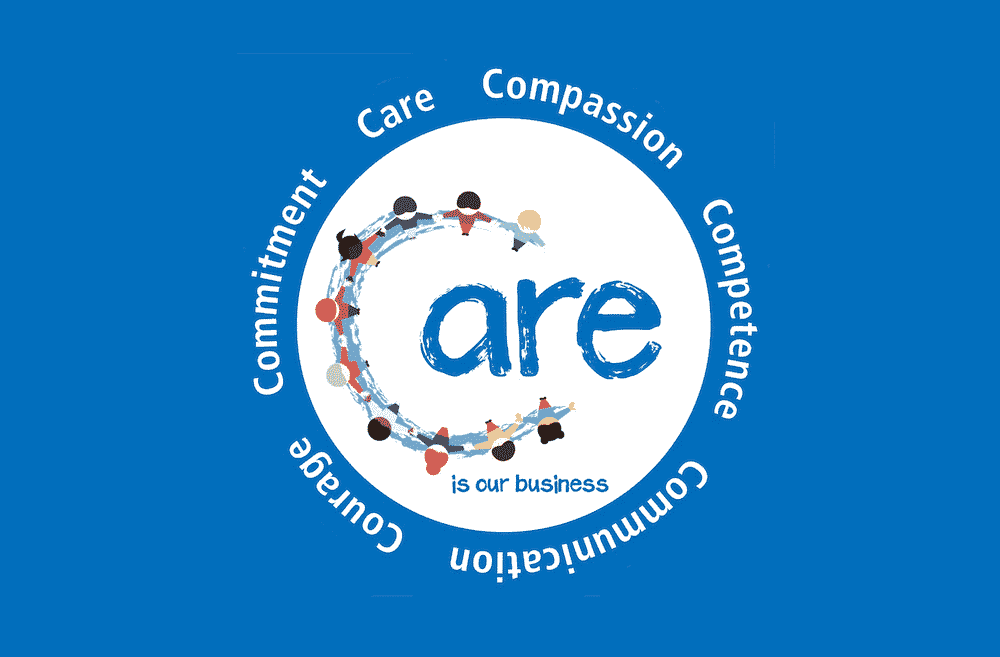The 6Cs of Nursing are fundamental values introduced by the National Health Service (NHS) in the UK under the Compassion in Practice strategy.

The 6Cs are
1. Care
- Meaning: Care is the essential foundation of nursing and healthcare practice. It is about consistently meeting the physical, emotional, and psychological needs of patients and their families.
- Application: Care is holistic, focusing on treating not just the illness but also considering the person as a whole. It involves attention to detail in ensuring patient comfort, hygiene, and dignity.
- Impact: High-quality care leads to better health outcomes, faster recovery times, and improved patient satisfaction. Patients who feel genuinely cared for are more likely to trust healthcare professionals and follow treatment plans.
2. Compassion
- Meaning: Compassion is about showing empathy and understanding for the pain, discomfort, and anxieties that patients may be experiencing. It goes beyond merely treating illness, recognising the emotional and psychological impact of a patient’s situation.
- Application: Compassionate care involves listening to patient concerns, acknowledging their feelings, and responding to their individual needs. Healthcare professionals can show compassion by offering reassurance, giving emotional support, and ensuring a calm, comforting environment.
- Impact: Compassion enhances the patient experience and can significantly reduce anxiety, fear, and stress. It also fosters a deeper bond between healthcare workers and patients, creating a positive and supportive care environment.
3. Competence
- Meaning: Competence is the ability of healthcare professionals to provide safe, effective, and evidence-based care. It involves having the necessary knowledge, skills, and expertise to meet patient needs and adapt to new developments in healthcare.
- Application: Competence is maintained through continuous professional development, attending training, gaining experience, and staying updated with new research, treatments, and guidelines. Healthcare professionals must consistently evaluate their performance and seek feedback to improve their skills.
- Impact: Competent care ensures patient safety and the effectiveness of interventions. It reduces the risk of errors and enhances trust between patients and professionals. Competence is also critical for maintaining the credibility and integrity of the healthcare system.
4. Communication
- Meaning: Communication is central to effective care delivery and involves the exchange of information between healthcare professionals, patients, and their families. Good communication ensures that everyone understands the care process, treatment plans, and outcomes.
- Application: It includes both verbal and non-verbal communication. Healthcare workers must actively listen to patients, explain medical information in a way they can understand, and ensure clarity when discussing treatments or options. It also involves documentation, team collaboration, and liaising with other departments or services.
- Impact: Poor communication can lead to misunderstandings, mistakes, and diminished patient trust. Effective communication improves teamwork, streamlines care, and ensures that patients are fully informed about their treatment, contributing to better decision-making and care continuity.
5. Courage
- Meaning: Courage in nursing means having the strength to speak up for patients and the confidence to take action when necessary, even in challenging or uncomfortable situations. It is about standing by your ethical values and advocating for patient welfare.
- Application: Healthcare professionals may need to challenge decisions or practices that are unsafe or not in the patient’s best interest. Courage is required when dealing with difficult situations, such as reporting a colleague’s poor practice or handling conflict with patients or families. It also includes being open to innovation and change in practice.
- Impact: Courage is vital for maintaining patient safety and quality care. Healthcare workers who act with courage help to prevent harm, improve care standards, and foster a culture of accountability within healthcare organizations.
6. Commitment
- Meaning: Commitment refers to the dedication healthcare professionals show to their patients, the profession, and their continuous development. It involves consistently striving to provide the best care, maintaining high standards, and being a reliable team member.
- Application: Commitment can be demonstrated through a strong work ethic, showing resilience in the face of challenges, and continually seeking ways to improve patient outcomes. It also involves taking personal responsibility for professional development, ensuring that one’s practice stays current with evolving healthcare standards.
- Impact: Commitment ensures that healthcare professionals remain focused on patient-centered care and the well-being of those they serve. It promotes a culture of continuous improvement, ensuring that high-quality care is sustained across the profession. Committed healthcare professionals inspire confidence in patients and colleagues alike.
By embodying these values, healthcare professionals can help improve both the patient experience and the overall quality of care provided within the system.
